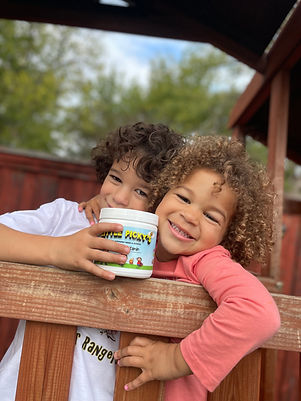Join the Team
Join our email list and get access to specials deals exclusive to our subscribers.
Free Shipping on your first order!!!!

THE SIDEKICK TO HELP FIGHT MEALTIME BATTLES

Ages 1-9yrs old
Picky eaters?
Kids have food allergies?
Kids on a vegan diet?
It's hard to absorb nutrients?
They avoid a specific food group/s?
A nutritional and flavorful multivitamin drink designed to complement your child’s meals or serves as a healthier beverage alternative
Stir 1 scoop in ice water
It's that easy!
Thoughtfully formulated where Kids can take it up to 3x/day


Now, you might glance at the daily value percentages and wonder,
"Is this enough?"
YES!!!
#1 nutritional source should come from Whole Foods
THEN
Little Picky's is to help your little one reach their daily goal from any left over food
The Daily Value Percentages were thoughtfully formulated to stay within the FDA Daily Values
Other Ingredients:
Citric Acid, Inulin (anti caking agent) Natural Flavors (Strawberry & Lemon), Silicon Dioxide, Rebaudioside A (From Stevia Leaf Extract), Beet Root (color)
Packed with more vitamins and minerals compared to traditional gummy vitamins.

Crafted by a mom with firsthand experience addressing children’s dietary challenges.
Specifically formulated to help fill nutritional gaps caused by picky eating, dietary restrictions, or uneaten meals.

What Sets Us Apart:
- Owned and created by a MOM
- It's a flavorful powder mix not a gummy
- No artificial ingredients
- Less than .5g sugar/serving
- Pediatrician approved
- Designed to stay in the recommended daily dose by the FDA
** This statement has not been evaluated by the FDA. This product is not intended to diagnose, treat, cure, or prevent any disease.
Quality Ingredients their bodies need!
Free from dyes, synthetic & artificial ingredients. Full of Belly Benefits.

Vitamin E- boosts your immune system and helps with the development of healthy skin and eyes.
Folate (L-5 Methyltetrahydrofolate Calcium)- helps you absorb protein and form new blood cells and DNA.
Calcium- builds strong bones and teeth.
Zinc- helps with growth, wound healing, and immune system function.
Magnesium- Provides structure for healthy bones, Involved in the release of energy from food, Essential for muscle and nerve function
Vitamin A- helps with eyesight, healthy skin, growth, development, and good immune function.
The B vitamins- important for metabolism, energy, and a healthy heart and nervous system. One of the most important B vitamins is B12.
Vitamin C- builds collagen and helps you fight infections and absorb iron from food. It also keeps teeth, bones, and gums healthy.
(We use Acerola Fruit Extract instead of Ascorbic Acid)
Vitamin D- Helps you absorb calcium to keep bones strong and healthy. (Ours is Plant Based)
Vitamin K2 (menaquinone)- A very important protein that helps build and maintain the structure of the bone are called osteocalcin. Without enough vitamin K2, osteocalcin cannot function to strengthen the bone for children and adults alike
Our Products Are:





Q & A
-
What makes Little Picky’s different from gummy vitamins?
-
Unlike gummy vitamins, which often contain added sugars and limited nutrients, Little Picky’s is a powdered multivitamin with more essential vitamins and minerals to help fill nutritional gaps. Plus, it allows flexible dosing up to three times a day while keeping kids within their recommended daily intake.
-
-
How do I use Little Picky’s powder? Can I mix it into any drink or food?
-
Yes! You can mix it into water, milk, smoothies, or juice, or even sprinkle it on yogurt, applesauce, or oatmeal. It’s designed to be easy to use and fit into your child’s daily routine.
-
-
Is it safe for my child to take Little Picky’s more than once a day?
-
Absolutely! Little Picky’s is formulated so that kids can take it up to three times a day without exceeding their recommended daily intake, allowing their primary nutrition to still come from whole foods.
-
-
What age group is this multivitamin best suited for?
-
Little Picky’s is designed for kids ages 1-9 yrs old. Always follow the recommended serving size based on age, and consult a pediatrician if needed.
-
-
Does Little Picky’s contain any artificial flavors, colors, or sweeteners?
-
No! Little Picky’s is free from artificial flavors, colors, and sweeteners. It’s made with clean ingredients to support your child’s health without unnecessary additives.
-
-
Is this product Gluten-Free?
-
Yes! Little Picky’s is third party tested which makes it a great choice for kids with food sensitivities.
-
-
How does Little Picky’s ensure kids get the right amount of nutrients without overloading?
-
Our formula carefully balances vitamins and minerals to stay within safe daily limits, so kids can take it throughout the day without exceeding their needs. It’s designed to support, not replace, a healthy diet.
-
-
Can I give Little Picky’s to my picky eater if they refuse most foods?
-
Yes! Little Picky’s is perfect for picky eaters who may not get enough nutrients from food alone. It helps fill nutritional gaps while being easy to mix into drinks or foods they already enjoy.
-
-
Where is Little Picky’s made, and is it third-party tested for quality?
-
Little Picky’s is made in the USA in an FDA-registered, GMP-certified facility and undergoes third-party testing to ensure safety, purity, and quality.
-
-
Does Little Picky’s help support immunity and overall health?
-
Yes! Little Picky’s includes essential vitamins and minerals like Vitamin C, D, and Zinc to help support immunity, energy, growth, and overall health.

































